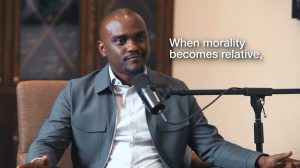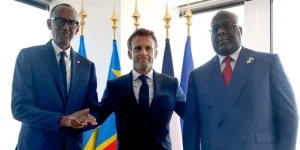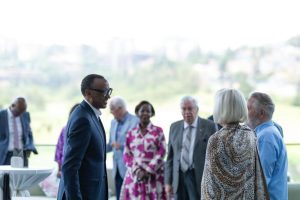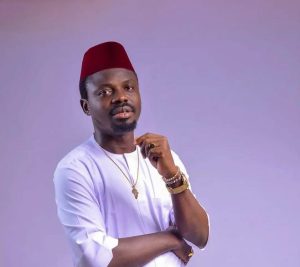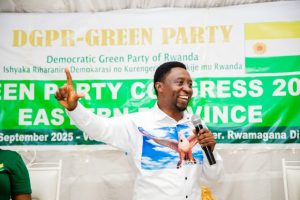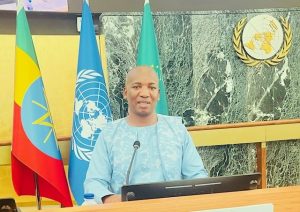The Crisis in the African Great Lakes: Justice Denied, Histories Erased
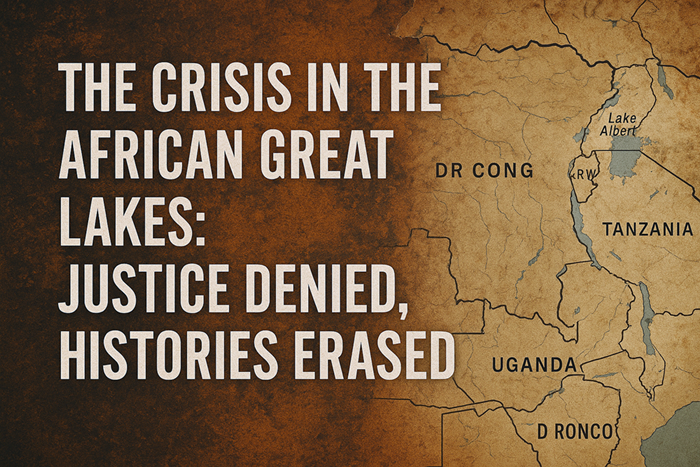
The Crisis in the African Great Lakes: Justice Denied, Histories Erased
By Fred Mfuranzima | July 2025
For far too long, the crisis in the African Great Lakes region has been framed through a Western lens — distorted, incomplete, and often politically motivated. The current accusations against Rwanda over its alleged role in the eastern Democratic Republic of Congo (DRC) unrest reflect a dangerous oversimplification of history, geopolitics, and justice. The real story begins not in Goma or Kinshasa — but in Brussels, under King Leopold II, and later with Western colonial cartography that tore through ethnic and cultural landscapes with careless arrogance.
Colonial Borders, Stolen Land, Broken Identities
The partitioning of Africa during the Berlin Conference created artificial states, separating ethnic groups and lumping others into dysfunctional entities. Rwanda, a small but historically coherent kingdom, lost significant territories to what are today Congo (DRC), Uganda, and Tanzania. Colonial masters like Belgium — unable to manage the resistance of the Rwandan people — saw it easier to dilute Rwanda’s power by fragmenting its people and land.
This fragmentation had profound consequences. Kinyarwanda-speaking communities were scattered across borders, with many in eastern DRC — especially in North and South Kivu — effectively treated as foreigners in their own ancestral land. They have endured systematic discrimination, displacement, and violence for decades, yet their suffering remains largely invisible to international narratives.
Mobutu, France, and the West’s Double Standards
After Congolese independence in 1960, the country fell into chaos — not by African failure, but by Western sabotage. Belgium, in complicity with the CIA, orchestrated the assassination of Patrice Lumumba and installed Mobutu Sese Seko, a brutal dictator who was their puppet for over three decades. Mobutu’s kleptocracy was not only tolerated but supported by France, the United States, and Belgium — as long as he aligned with Cold War interests.
It was under Mobutu that systemic persecution of Tutsi and Kinyarwanda-speaking Congolese intensified. The seeds of future rebellion — CNDP, M23, AFC — were sown under his regime, which deliberately marginalized these populations while importing instability from Rwanda’s genocide period.
Moreover, the infamous French Operation Turquoise, ostensibly a humanitarian mission, allowed génocidaires of the Interahamwe and FAR (who later became the FDLR) to escape into eastern Congo. Rather than dismantling these forces, they were allowed to regroup — a foreign-made fire that continues to burn the region.
M23 and the Myth of Rwandan Aggression
The rise of M23 (and earlier CNDP under Laurent Nkunda) must be understood in this historical context. These rebellions were not created by Rwanda — they were born out of legitimate grievances by Congolese citizens of Rwandophone heritage who have been denied citizenship, land rights, and security.
To paint all unrest in eastern Congo as a Rwandan invasion is not just inaccurate — it’s lazy. It erases the root causes and ignores the DRC’s own internal failures. Ironically, the areas controlled by M23/AFC are now among the safest in eastern Congo — unlike areas controlled by over 200 other armed groups operating under the so-called Wazalendo coalition, many of which are backed or tolerated by Kinshasa itself.
A Government Built on Chaos and Corruption
Félix Tshisekedi, the current Congolese president, came to power with Belgian blessing — he spent years in Brussels and was largely unknown to many Congolese voters. His path to the presidency was murky, with credible allegations of a power-sharing deal with Joseph Kabila. That a former Brussels driver now governs a country the size of Western Europe is less an underdog story and more a symptom of international manipulation.
Since his rise, governance in the DRC has worsened. Reports by the World Bank and UNDP confirm staggering levels of poverty:
- Over 62% of the population live on less than $2.15 a day
- More than 27 million Congolese suffer from acute food insecurity (WFP, 2024)
- Over $15 billion has disappeared through corruption scandals between 2020–2024 (IMF, World Bank Reports)
- Public officials and their families siphon national resources while schools, hospitals, and roads decay.
Instead of addressing these internal dysfunctions, Kinshasa scapegoats Rwanda — a much smaller neighbor with a record of economic progress and internal stability.
A Refugee Crisis Forgotten
Kinyarwanda-speaking Congolese refugees have lived in exile for over 30 years. Many were resettled in North America, scattered in Canada and the U.S., often separated from family and heritage. Others languish in camps across Uganda and Rwanda. They remain stateless, voiceless, and expendable — even as the world touts its commitment to human rights.
The Real Injustice
While media headlines vilify Rwanda and glorify Kinshasa, justice itself has been murdered. Belgium — the architect of both Rwanda and Congo’s suffering — has never been held accountable. France continues to evade responsibility for its role in the Rwandan Genocide and post-genocide destabilization. The United Nations, which has spent over $20 billion on MONUSCO, has failed to bring lasting peace.
True justice will not come from selectively pointing fingers. It will come from:
- Recognizing the legitimacy of marginalized communities like Kinyarwanda-speaking Congolese.
- Acknowledging historical responsibilities of Belgium, France, and other colonial and post-colonial actors.
- Condemning all armed groups, not only those politically convenient to blame.
- Reframing peace efforts around equity, citizenship, truth-telling, and local empowerment.
Conclusion: Who Defines Justice?
As the West fixates on Rwanda and M23, it turns a blind eye to the deeper questions: Who created the mess in the first place? Who benefits from perpetual chaos in Congo? Why are some armed groups legitimized and others criminalized?
Justice for the African Great Lakes will remain elusive as long as history is distorted, and accountability is selective. Until then, Rwanda — whether led by Kagame or anyone else — will remain both the scapegoat and the inconvenient truth-teller in a global narrative afraid to face its colonial sins.

SUBSCRIBE TO OUR NEWSLETTER

